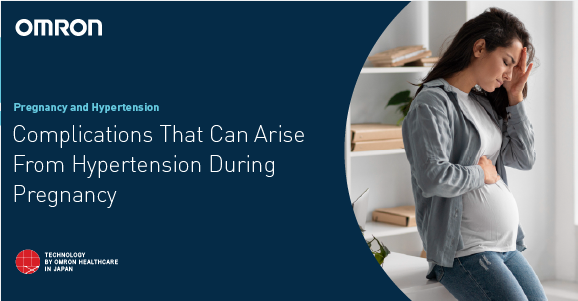The complications that can arise from hypertension during pregnancy
September 5, 2023 2024-01-25 18:15The complications that can arise from hypertension during pregnancy

The complications that can arise from hypertension during pregnancy
Pregnancy is a life-changing experience that brings forth significant physical and emotional changes for a woman. While it is a joyful and exciting time, it can also bring up health issues, the most worrisome of which is hypertension during pregnancy. Hypertension, commonly known as high blood pressure, can complicate pregnancy in various ways, posing risks to the mother and the developing baby.
Hypertension in Pregnancy:
Hypertension during pregnancy can be classified into two primary categories:
- Chronic Hypertension: Some women enter pregnancy with pre-existing high blood pressure, a condition known as chronic hypertension. It can increase the risk of complications during pregnancy and may require careful management.
- Gestational Hypertension: This form of hypertension develops after the 20th week of pregnancy and typically resolves after childbirth. However, it can progress to a more severe condition called pre-eclampsia, which we will discuss later. [1]
Complications Arising from Hypertension During Pregnancy
Preeclampsia
Preeclampsia is a severe and potentially life-threatening condition often arising from gestational hypertension. It typically presents after the 20th week of pregnancy and is characterized by high blood pressure and damage to other organ systems, such as the liver and kidneys. Symptoms of pre-eclampsia include swelling in the legs, sudden weight gain, headaches, and vision changes. [2]
Preeclampsia can lead to various complications, including:
- Eclampsia: This is a severe form of preeclampsia characterized by seizures. Eclampsia poses a significant risk to both the mother and the baby and requires immediate medical intervention.
- Placental Abruption: Preeclampsia can lead to the premature separation of the placenta from the uterine wall, a condition known as placental abruption. This can result in severe bleeding and oxygen deprivation to the baby.
- Restricted Fetal Growth: The reduced blood flow caused by preeclampsia can impair fetal growth, leading to low birth weight and related health issues for the baby.
- Preterm Birth: Preeclampsia often necessitates early delivery to protect the health of the mother and baby. Premature birth can lead to many complications for the newborn, including respiratory distress syndrome.
Gestational Diabetes
Hypertension during pregnancy is closely linked to gestational diabetes, a condition characterized by high blood sugar levels that develop during pregnancy. Together these two conditions can increase the risk of complications such as macrosomia (a large baby), birth injuries, and the need for a cesarean section.
Cardiovascular Complications
High blood pressure during pregnancy can strain the cardiovascular system, increasing the risk of heart problems for the mother. It can lead to conditions like hypertensive heart disease, which may persist beyond pregnancy and require long-term management.
Kidney Problems
Hypertension during pregnancy can strain the kidneys, leading to kidney damage or worsening pre-existing kidney conditions. This can have long-term implications for both the mother’s and baby’s health.
Preterm Birth
Hypertension during pregnancy is a leading cause of preterm birth, which carries its own complications. Premature babies are more likely to experience respiratory distress syndrome, infections, and developmental problems.
Intrauterine Growth Restriction (IUGR)
IUGR occurs when the baby does not grow at the expected rate inside the womb. Hypertension can restrict the blood flow to the placenta, reducing the oxygen and nutrients available to the baby leading to IUGR.
Long-term Health Implications
Hypertension during pregnancy can have lasting effects on both the mother and baby. Mothers who experience hypertension during pregnancy are at an increased risk of developing chronic hypertension later in life. For the baby, it can set the stage for future health issues, such as obesity, high blood pressure, and heart disease.[3]
Prevention, Monitoring, and Management
Prevention, monitoring, and management are crucial given the potential complications of hypertension during pregnancy.
Key strategies for managing Hypertension:
- Regular Prenatal Care: Early and consistent prenatal care is essential. Regular check-ups allow healthcare providers to monitor blood pressure, detect hypertension early, and provide appropriate interventions. [4]
- Lifestyle Modifications: Adopting a healthy lifestyle can help manage blood pressure during pregnancy. This includes maintaining a balanced diet, staying physically active (as your healthcare provider recommends), and managing stress.
- Regular blood pressure monitoring: When it comes to managing hypertension during pregnancy, having a reliable blood pressure monitor is invaluable. The Omron BP monitor is a trusted and user-friendly device that allows expectant mothers to monitor their blood pressure from the comfort of their homes.[5]
- Medication: Sometimes, medication may be necessary to control hypertension during pregnancy. Working closely with a healthcare provider to determine the safest and most effective treatment plan is essential.
- Fetal Monitoring: Regular fetal monitoring is essential to assess the baby’s growth and well-being. This can include ultrasound scans and non-stress tests.
- Delivery Planning: The timing and mode of delivery will depend on the severity of hypertension and other factors. In some cases, early delivery may be recommended to protect the mother’s and baby’s health.
Conclusion
Hypertension during pregnancy is a serious condition that can lead to various complications for both the mother and the baby. Expectant mothers must work closely with their healthcare providers to ensure a safe and healthy pregnancy. By taking proactive steps and following medical guidance, women can increase their chances of experiencing a successful pregnancy and giving birth to a healthy baby.
Reference:
- https://www.cdc.gov/bloodpressure/pregnancy.htm
- https://my.clevelandclinic.org/health/diseases/17952-preeclampsia#:~:text=Preeclampsia%20is%20a%20serious%20medical,treated%20by%20a%20healthcare%20provider.
- https://www.mayoclinic.org/healthy-lifestyle/pregnancy-week-by-week/in-depth/pregnancy/art-20046098
- https://my.clevelandclinic.org/health/diseases/4497-gestational-hypertension#:~:text=If%20you’re%20at%20risk,serious%20complications%20of%20the%20disease.
- https://www.omronbrandshop.com/blood-pressure-monitors/






